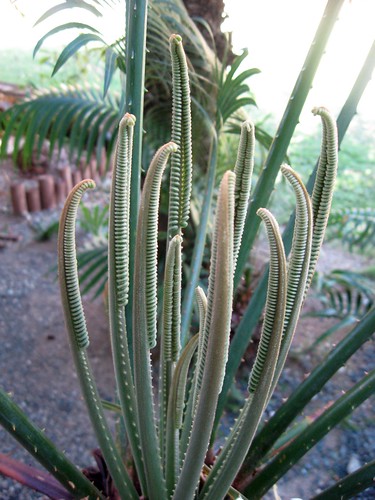
This is very young flush of new leaves on a cycad which is most likely Cycas rumphii (or at the very least part of the Cycas rumphii complex). There are a number of plants of this species of a similar age across the island (some have done better than others but they all look to have been planted around the same time) which makes me think someone imported or germinated a batch somewhere in the distant past. At that time it would most likely identified erroneously as Cycas circinalis but true circinalis is an indian endemic which was vary rarely exported at the time and in any event plants mainly came from elsewhere in asia. These plants would then be more correctly assigned to Cycas rumphii but that has been split into a number of species including C. celebica, C. bougainvilleana and C. micronesica (to name but a few). Most of these plants can only be distinguished from another by experts examining weird botanical details of the seeds or cones or by the location of plants in habitat making it all rather confusing to the layman like me. dealing with non-coning plants of indeterminate origin. You can delve into the fascinating detail here if you want to dip a toe in this murky world. Not only that but many of the species in this family have remarkable floating seeds which has enabled them to float across seas and colonise new landmasses much in the same way as coconuts do. Of course this could lead to plants ending up somewhere strange and confusing a passing botanist further still but this little group will do that for you so best to just enjoy how pretty it looks. After all the concept of species names doesn't mean a lot to a family which has been taking care of business for 300 million years longer than the species doing the naming.
4 comments:
Fabulous photo, Tai... I once took care of some C. circinalis, and found them far more responsive (coning even!) than the common C. revoluta, which is pretty easy for me to kill in our dry environs. Hope I run across some circies again... I greatly enjoy your wonderful cycad posts.
Thanks Sally - I'm jealous you got your hands on circinalis, I have rumphii at home and found it to be similarly tough compared to revoluta (though not yet coning).
I'm glad you enjoy the cycad posts - I got a couple of bits of exciting news which may lead to some really interesting cycad posts in the next few weeks (he says tempting fate).
I'm having a great time going through all of your pictures, and I just watched your shark video. FYI, I cracked up at the end!
Thanks Dreamybee - I still chortle to myself when I see that gag!
Post a Comment